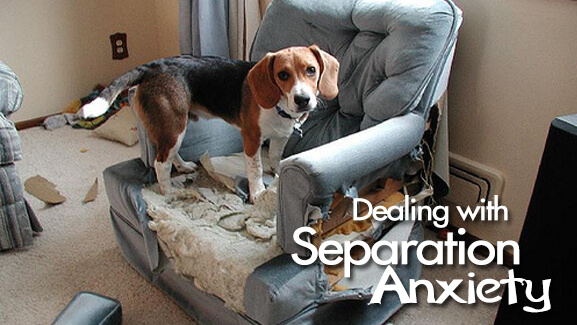Episode 4: Separation Anxiety in Dogs
[mw-video-wrapper video=”QgHGTeeKAwM”]
Separation Anxiety Can Affect a Pet’s Health and Home Life
No matter how much you love your pet, they sometimes engage in dangerous, dysfunctional behaviors that can affect both their health and their home life. One of the most common (and most frustrating) is separation anxiety.
Understanding what it is and why it happens, is the first step in making your pet feel more calm and reassured when you leave.
What is separation anxiety?
Separation anxiety is the fear or dislike of isolation, resulting in bad behaviors while the pet is alone. There are quite a few reasons why your pet might be anxious:
- The pet is overly dependent on the owner
- Traumatic events as a youngster
- Abnormal predisposition to dependency
- Early separation from its mother, especially for dogs kept in stores or animal shelters
- Sudden change of environment, like a new home or kennel
- Lifestyle changes for the owner that affects the time spent with the pet, a long-term absence of a loved family member, or a new addition to the family
When a pet is anxious, it might pee or poop in inappropriate areas, destroy toys and/or furniture, bark or whine excessively or become depressed or hyperactive.
These could be symptoms of other problems, too. But if the pet changes its mood shortly after you return home, then separation anxiety is the most likely cause. If this behavior is prolonged and doesn’t change once you return, have your pet checked by a vet to rule out any other issues.
Possible solutions
Treatments can take many forms. People try everything from punishment to crate training to obedience training. These might address some of the problem behaviors, but they can still overlook the root of the issue and force the dog to replace his behavior with another inappropriate coping mechanism.
Punishment tends to be ineffective, as it simply increases the pet’s anxiety.
Instead, you should slowly acclimate your pet to being alone by increasing the time you spend away. Avoid over stimulating your pet when you return – arrive in a quiet and casual way. Use a soft voice, and do not offer praise when you return.
Medication can be used, but should be reserved for the most severe cases. It won’t be effective on its own. A treatment program combined with medication will have a more lasting effect.
A professional trainer can further teach you and your family ways to reduce and cope with separation anxiety.
Your turn
Separation anxiety can make the owner just as anxious as the pet. Hopefully this post has left you with a greater understanding of its causes and possible solutions.
If you have any questions about what was discussed, feel free to leave your thoughts in the comment section below and I will be sure to respond promptly.
If you found this post useful, please share it with your friends on your social media networks!
Also, feel free to make an appointment today for your pet, or just come by and visit. We’ll be happy to see you!!

